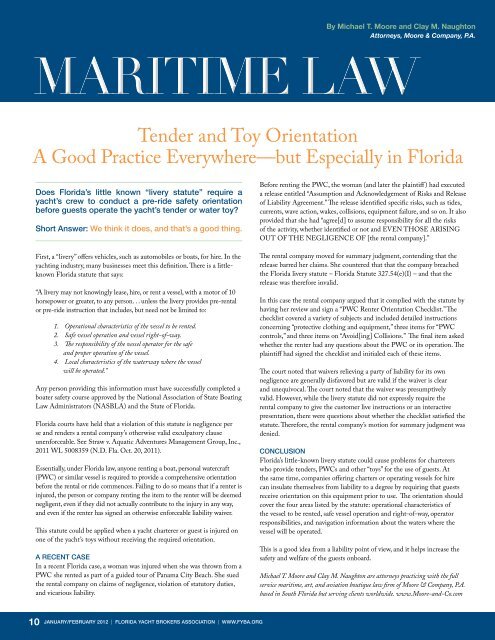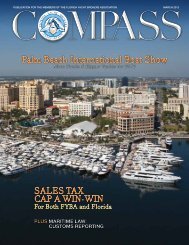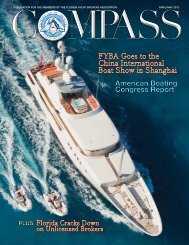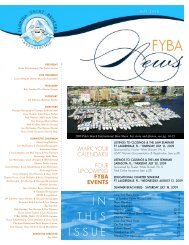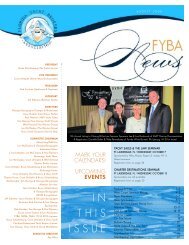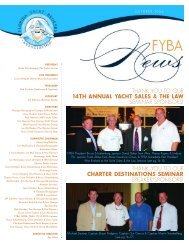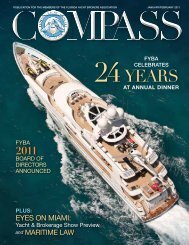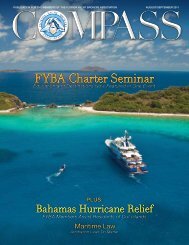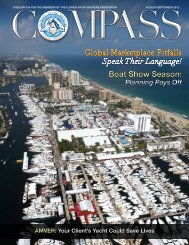Jan/Feb 2012 - Florida Yacht Brokers Association, Inc.
Jan/Feb 2012 - Florida Yacht Brokers Association, Inc.
Jan/Feb 2012 - Florida Yacht Brokers Association, Inc.
Create successful ePaper yourself
Turn your PDF publications into a flip-book with our unique Google optimized e-Paper software.
MaritiMe Law<br />
Tender and Toy Orientation<br />
A Good Practice Everywhere—but Especially in <strong>Florida</strong><br />
does florida’s little known “livery statute” require a<br />
yacht’s crew to conduct a pre-ride safety orientation<br />
before guests operate the yacht’s tender or water toy?<br />
short answer: we think it does, and that’s a good thing.<br />
First, a “livery” offers vehicles, such as automobiles or boats, for hire. In the<br />
yachting industry, many businesses meet this definition. There is a littleknown<br />
<strong>Florida</strong> statute that says:<br />
“A livery may not knowingly lease, hire, or rent a vessel, with a motor of 10<br />
horsepower or greater, to any person. . . unless the livery provides pre-rental<br />
or pre-ride instruction that includes, but need not be limited to:<br />
1. Operational characteristics of the vessel to be rented.<br />
2. Safe vessel operation and vessel right-of-way.<br />
3. The responsibility of the vessel operator for the safe<br />
and proper operation of the vessel.<br />
4. Local characteristics of the waterway where the vessel<br />
will be operated.”<br />
Any person providing this information must have successfully completed a<br />
boater safety course approved by the National <strong>Association</strong> of State Boating<br />
Law Administrators (NASBLA) and the State of <strong>Florida</strong>.<br />
<strong>Florida</strong> courts have held that a violation of this statute is negligence per<br />
se and renders a rental company’s otherwise valid exculpatory clause<br />
unenforceable. See Straw v. Aquatic Adventures Management Group, <strong>Inc</strong>.,<br />
2011 WL 5008359 (N.D. Fla. Oct. 20, 2011).<br />
Essentially, under <strong>Florida</strong> law, anyone renting a boat, personal watercraft<br />
(PWC) or similar vessel is required to provide a comprehensive orientation<br />
before the rental or ride commences. Failing to do so means that if a renter is<br />
injured, the person or company renting the item to the renter will be deemed<br />
negligent, even if they did not actually contribute to the injury in any way,<br />
and even if the renter has signed an otherwise enforceable liability waiver.<br />
This statute could be applied when a yacht charterer or guest is injured on<br />
one of the yacht’s toys without receiving the required orientation.<br />
a recent case<br />
In a recent <strong>Florida</strong> case, a woman was injured when she was thrown from a<br />
PWC she rented as part of a guided tour of Panama City Beach. She sued<br />
the rental company on claims of negligence, violation of statutory duties,<br />
and vicarious liability.<br />
10<br />
january/february <strong>2012</strong> | florida yacht brokers association | www.fyba.org<br />
By Michael T. Moore and Clay M. Naughton<br />
attorneys, Moore & Company, P.a.<br />
Before renting the PWC, the woman (and later the plaintiff ) had executed<br />
a release entitled “Assumption and Acknowledgement of Risks and Release<br />
of Liability Agreement.” The release identified specific risks, such as tides,<br />
currents, wave action, wakes, collisions, equipment failure, and so on. It also<br />
provided that she had “agree[d] to assume responsibility for all the risks<br />
of the activity, whether identified or not and EVEN THOSE ARISING<br />
OUT OF THE NEGLIGENCE OF [the rental company].”<br />
The rental company moved for summary judgment, contending that the<br />
release barred her claims. She countered that that the company breached<br />
the <strong>Florida</strong> livery statute – <strong>Florida</strong> Statute 327.54(e)(I) – and that the<br />
release was therefore invalid.<br />
In this case the rental company argued that it complied with the statute by<br />
having her review and sign a “PWC Renter Orientation Checklist.” The<br />
checklist covered a variety of subjects and included detailed instructions<br />
concerning “protective clothing and equipment,” three items for “PWC<br />
controls,” and three items on “Avoid[ing] Collisions.” The final item asked<br />
whether the renter had any questions about the PWC or its operation. The<br />
plaintiff had signed the checklist and initialed each of these items.<br />
The court noted that waivers relieving a party of liability for its own<br />
negligence are generally disfavored but are valid if the waiver is clear<br />
and unequivocal. The court noted that the waiver was presumptively<br />
valid. However, while the livery statute did not expressly require the<br />
rental company to give the customer live instructions or an interactive<br />
presentation, there were questions about whether the checklist satisfied the<br />
statute. Therefore, the rental company’s motion for summary judgment was<br />
denied.<br />
conclusion<br />
<strong>Florida</strong>’s little-known livery statute could cause problems for charterers<br />
who provide tenders, PWCs and other “toys” for the use of guests. At<br />
the same time, companies offering charters or operating vessels for hire<br />
can insulate themselves from liability to a degree by requiring that guests<br />
receive orientation on this equipment prior to use. The orientation should<br />
cover the four areas listed by the statute: operational characteristics of<br />
the vessel to be rented, safe vessel operation and right-of-way, operator<br />
responsibilities, and navigation information about the waters where the<br />
vessel will be operated.<br />
This is a good idea from a liability point of view, and it helps increase the<br />
safety and welfare of the guests onboard.<br />
Michael T. Moore and Clay M. Naughton are attorneys practicing with the full<br />
service maritime, art, and aviation boutique law firm of Moore & Company, P.A.<br />
based in South <strong>Florida</strong> but serving clients worldwide. www.Moore-and-Co.com


